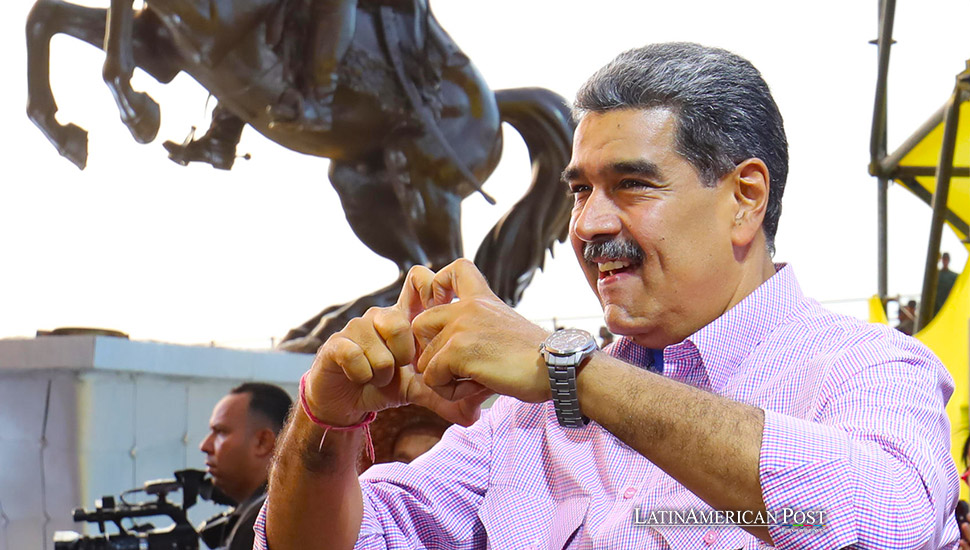Latin America’s Leftist Governments Join in Rejection of Maduro’s Election Victory

In a rare show of unity, ten Latin American governments, including several leftist administrations, have joined the United States in categorically rejecting the Venezuelan supreme court’s decision to confirm Nicolás Maduro’s contested re-election. This collective condemnation highlights the growing consensus across the political spectrum that Maduro’s regime has undermined democratic principles.
In a political landscape often divided by ideology, it is striking to see Latin America’s leftist governments standing alongside their conservative counterparts in rejecting Nicolás Maduro’s claim to re-election. The Venezuelan supreme court’s recent decision to uphold Maduro’s victory has drawn widespread condemnation from ten Latin American governments, including those traditionally aligned with leftist ideals. This rare consensus underscores the deepening concerns over the erosion of democratic norms in Venezuela, even among those who once might have been sympathetic to Maduro’s socialist rhetoric.
The governments of Argentina, Costa Rica, Chile, Ecuador, Guatemala, Panama, Paraguay, Peru, the Dominican Republic, Uruguay, and the United States issued a joint statement calling for an “impartial and independent audit” of the Venezuelan election results. Their collective stance rejects Maduro’s claim to power. It marks a significant shift in the regional political dynamic, where leftist governments are now vocal in their opposition to what they see as a fraudulent and autocratic regime.
Chile’s progressive president, Gabriel Boric, and Guatemala’s center-left leader, Bernardo Arévalo, made strong statements denouncing the Venezuelan government’s actions. Boric, who has emerged as one of Maduro’s most outspoken critics, declared, “I have no doubt this election has been stolen.” Arévalo echoed this sentiment, tweeting, “The Maduro regime is not democratic, and we do not recognize its fraud.” These statements are particularly notable given the leaders’ leftist credentials, which traditionally might have aligned them more closely with Maduro’s self-styled socialist government.
Leftist Leaders Demand Transparency
Leftist leaders’ decision to reject Maduro’s re-election is rooted in a broader concern about his government’s legitimacy and its impact on democratic governance in the region. Brazil’s Luiz Inácio Lula da Silva and Colombia’s Gustavo Petro, who have historical ties to the Maduro political movement inherited from Hugo Chávez, have also refused to recognize his re-election without seeing detailed voting tallies. This stance marks a significant departure from their previous positions, indicating a growing frustration with Maduro’s disregard for democratic processes.
These leaders’ demands for transparency and verifiable results reflect a commitment to upholding democratic principles, even when distancing themselves from a former ally. Lula and Petro, who have been exploring diplomatic solutions to the Venezuelan crisis, are expected to issue a joint statement reinforcing their position. Similarly, Mexico’s President Andrés Manuel López Obrador, another prominent leftist figure, has called for detailed voting tallies before recognizing the official result.
This collective stance among Latin America’s leftist leaders signals a recognition that Maduro’s continued claims to power threaten the region’s democratic stability. Their willingness to break ranks with Maduro, despite shared ideological roots, underscores the seriousness with which they view the crisis in Venezuela.
Regional Stability at Risk
The unified rejection of Maduro’s re-election by leftist and conservative governments has significant implications for regional stability. Venezuela’s descent into autocracy has been accompanied by a severe economic crisis, leading to widespread human rights violations and mass emigration. The international community’s response, particularly from Latin American nations, reflects a growing consensus that Maduro’s regime is a destabilizing force in the region.
The joint statement from the ten Latin American governments and the United States not only calls for an audit of the election results but also expresses “profound concern” over the human rights abuses committed during Maduro’s post-election crackdown. Activists report that more than 1,600 people have been detained and at least 24 others killed in the wake of the contested election. This level of violence and repression has further eroded Maduro’s legitimacy and increased calls for international intervention.
The European Union has also voiced its disapproval. EU foreign policy chief Josep Borrell stated that the 27 member states would not recognize Maduro’s re-election without seeing “a verifiable result.” This international pressure, coupled with the rejection within the region, places Maduro in an increasingly isolated position. However, with the support of Venezuela’s military and allies, such as Russia and China, Maduro remains defiant, preparing to be sworn in for his third six-year term as president.
Leftist Governments Draw a Line
Leftist governments’ decision to reject Maduro’s re-election is a clear signal that they are unwilling to support a regime that undermines democratic values, even if it claims to share its ideological roots. This shift is significant, as it marks a departure from the historical solidarity that leftist governments in Latin America have often shown toward each other.
Chile’s Gabriel Boric has been particularly vocal in his criticism, stating unequivocally that “we are dealing with a dictatorship that falsifies elections.” His comments reflect a broader sentiment among Latin America’s leftist leaders that Maduro’s actions cannot be defended on the grounds of shared ideology. Instead, they view the defense of democracy as paramount, even if it means opposing a government that once aligned with their political movements.
Guatemala’s President Bernardo Arévalo has also taken a firm stand, rejecting the notion that Maduro’s regime represents a legitimate leftist government. His tweet, “The Maduro regime is not democratic, and we do not recognize its fraud,” encapsulates the growing disillusionment with Maduro among the region’s left-leaning leaders. This disillusionment is driven by a recognition that Maduro’s continued grip on power is not only harmful to Venezuela but also poses a threat to the democratic integrity of the entire region.
The collective rejection of Maduro’s re-election by these governments, particularly those with leftist credentials, represents a significant moment in Latin American politics. It highlights the growing recognition that ideological alignment cannot justify abandoning democratic principles. As these leaders continue to push for transparency and accountability, they draw a clear line in the sand: democracy must be defended, even if it means opposing a former ally.
A New Era of Accountability in Latin America
Ten Latin American governments, including several leftist administrations, have united against Nicolás Maduro’s contested re-election, marking a turning point in the region’s political landscape. This collective rejection, driven by a commitment to democratic principles, underscores the seriousness of the crisis in Venezuela and its broader implications for regional stability.
As leftist leaders like Gabriel Boric, Bernardo Arévalo, Luiz Inácio Lula da Silva, and Gustavo Petro distance themselves from Maduro, they send a clear message: the defense of democracy transcends ideological loyalty. This shift in the regional dynamic has the potential to reshape Latin America’s political landscape as governments across the spectrum come together to uphold the principles of transparency, accountability, and human rights.
Also read: U.S. Denies Amnesty Offer to Venezuela’s Maduro Post-Election
The road ahead will not be accessible in the face of Maduro’s continued defiance and the support he retains from powerful allies. However, the unified rejection of his re-election by Latin American governments represents a crucial step toward greater accountability and restoring democratic norms in the region. The actions of these leaders demonstrate that, regardless of ideology, the commitment to democracy must remain steadfast if the area is to navigate its challenges and build a more stable and just future.




